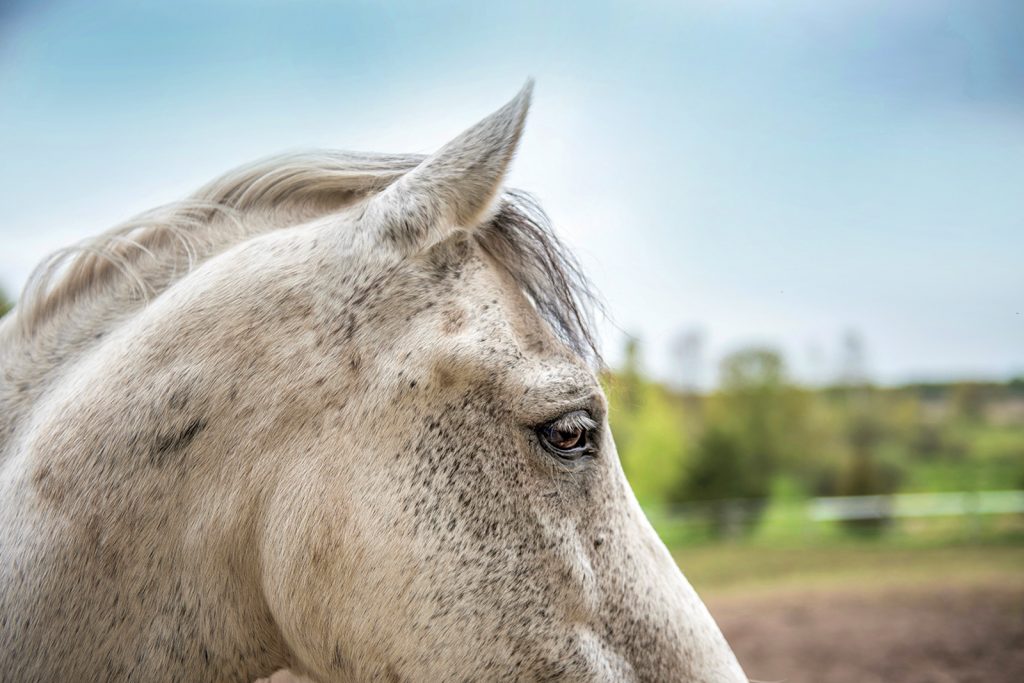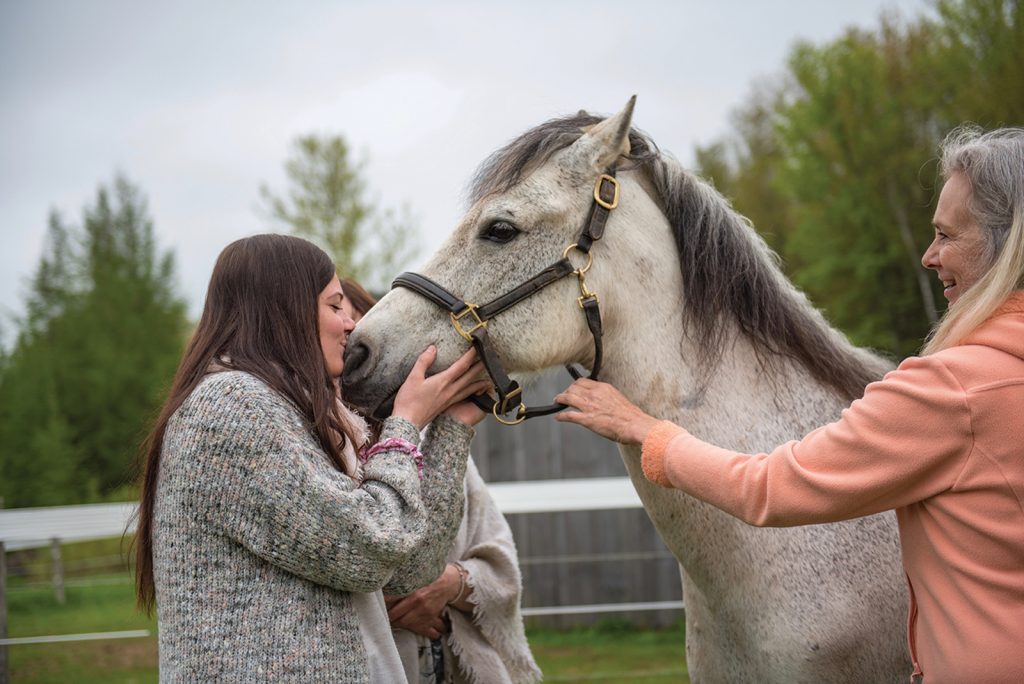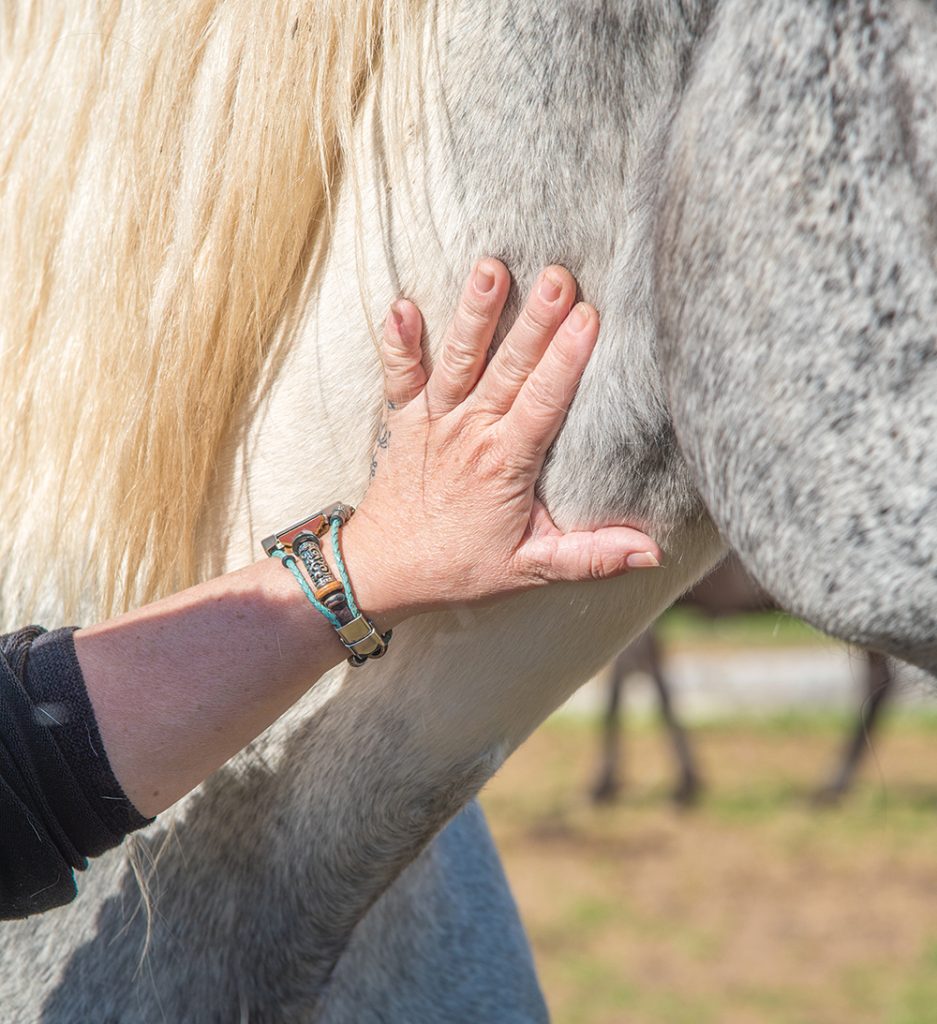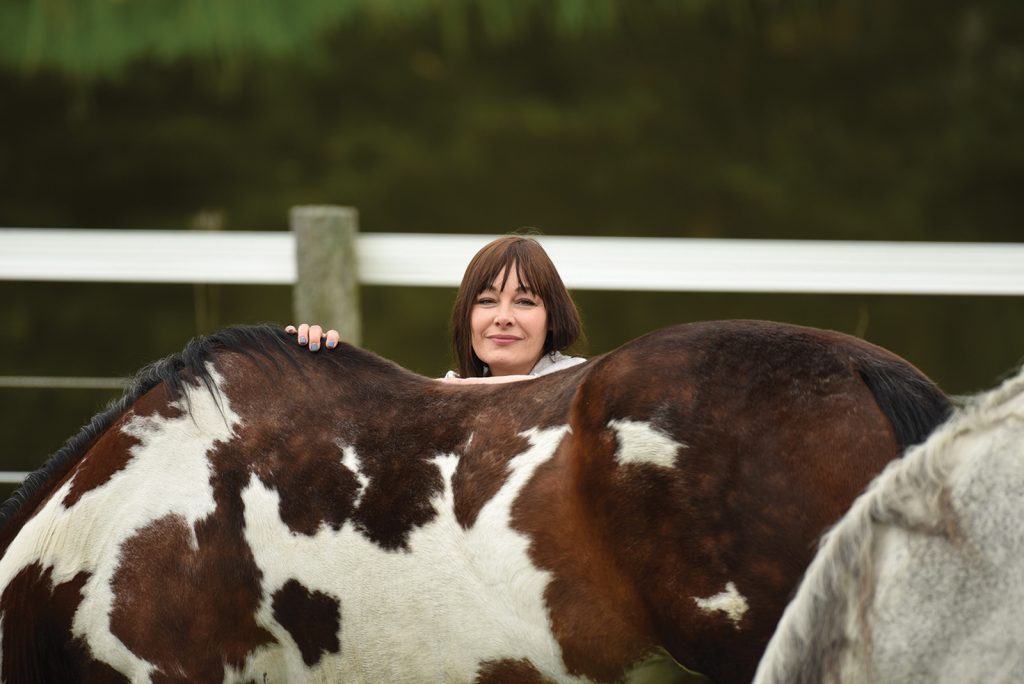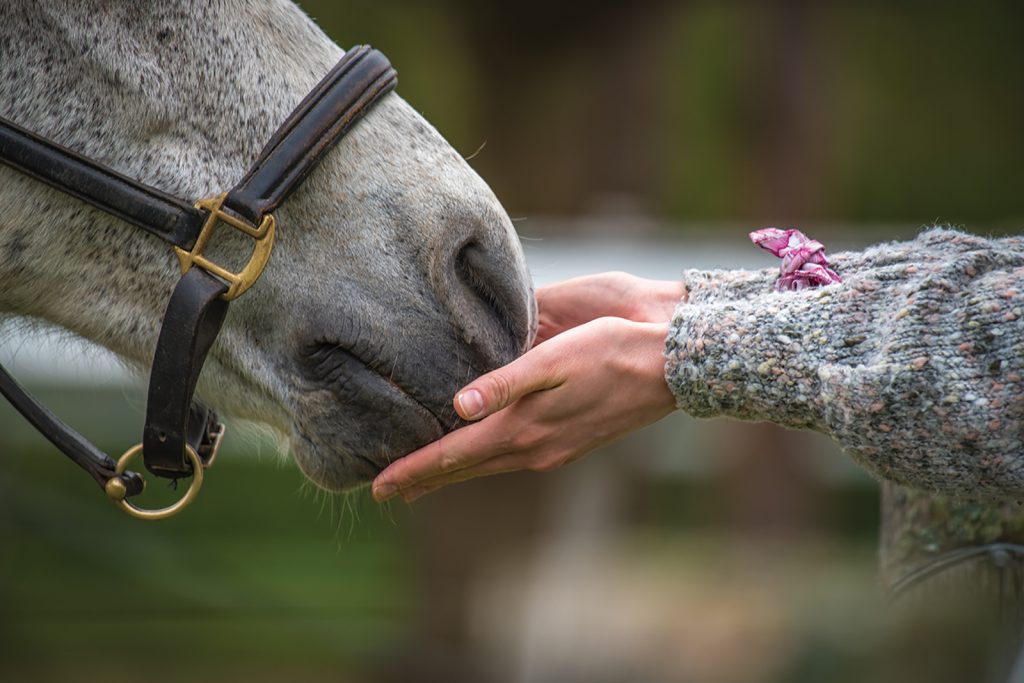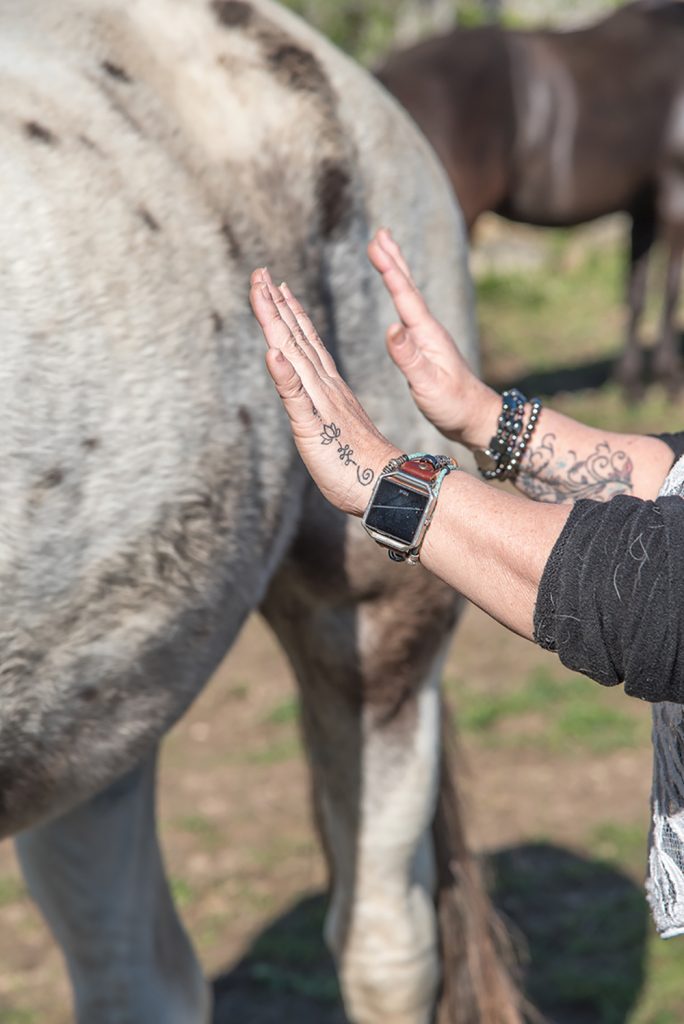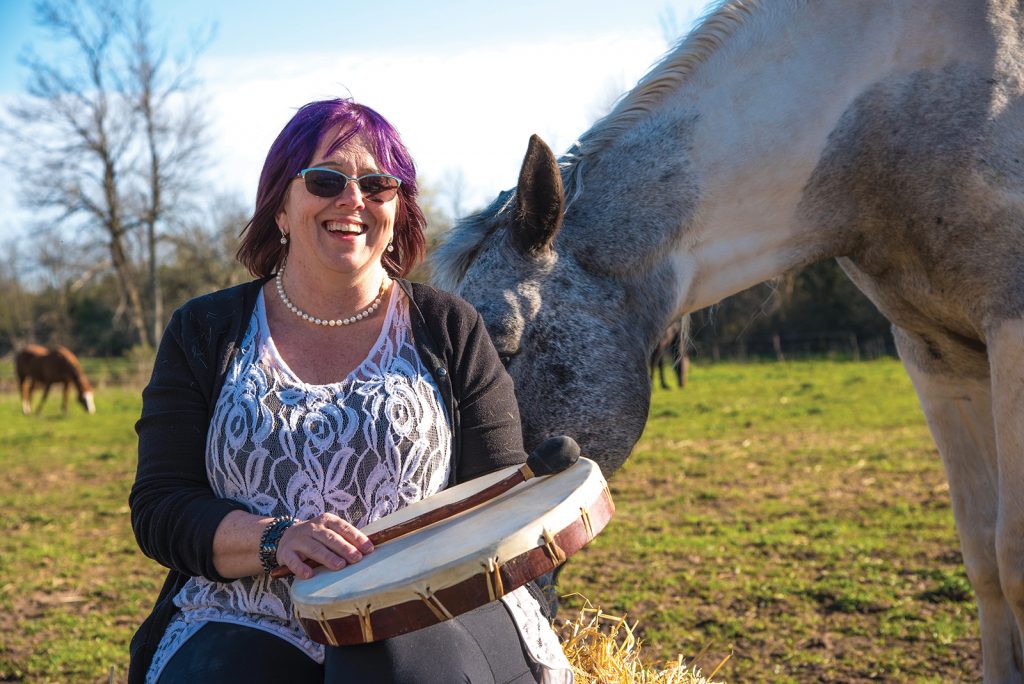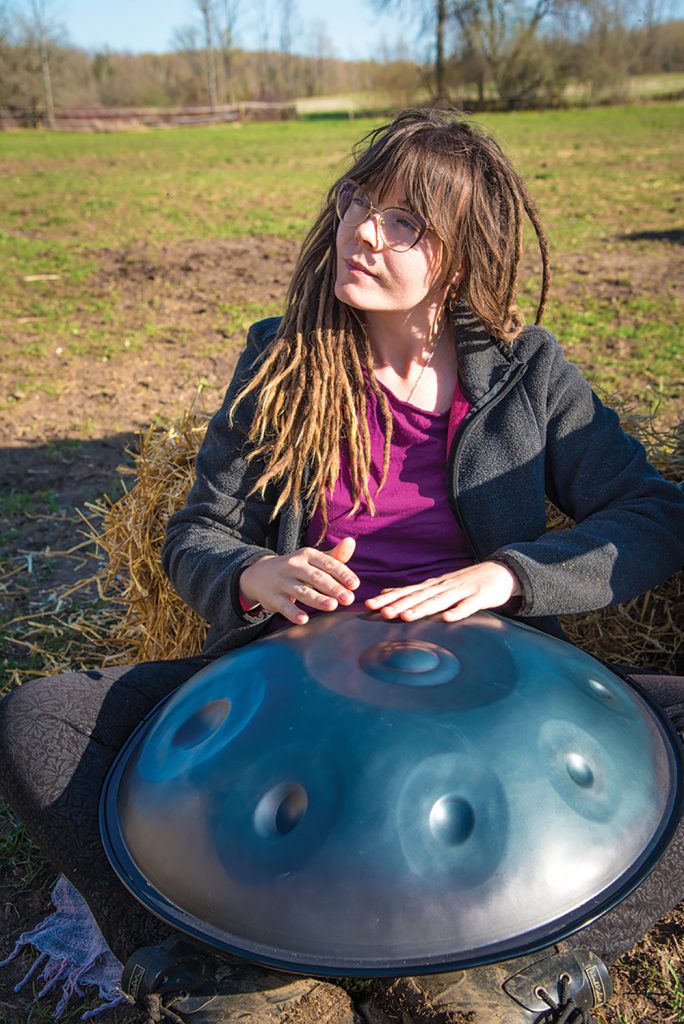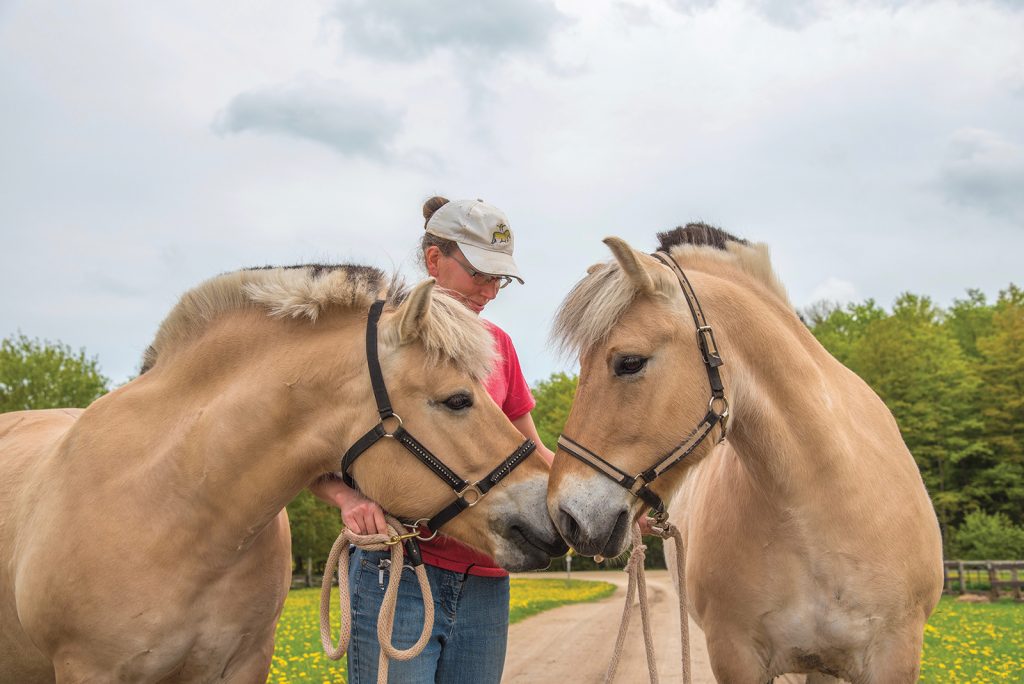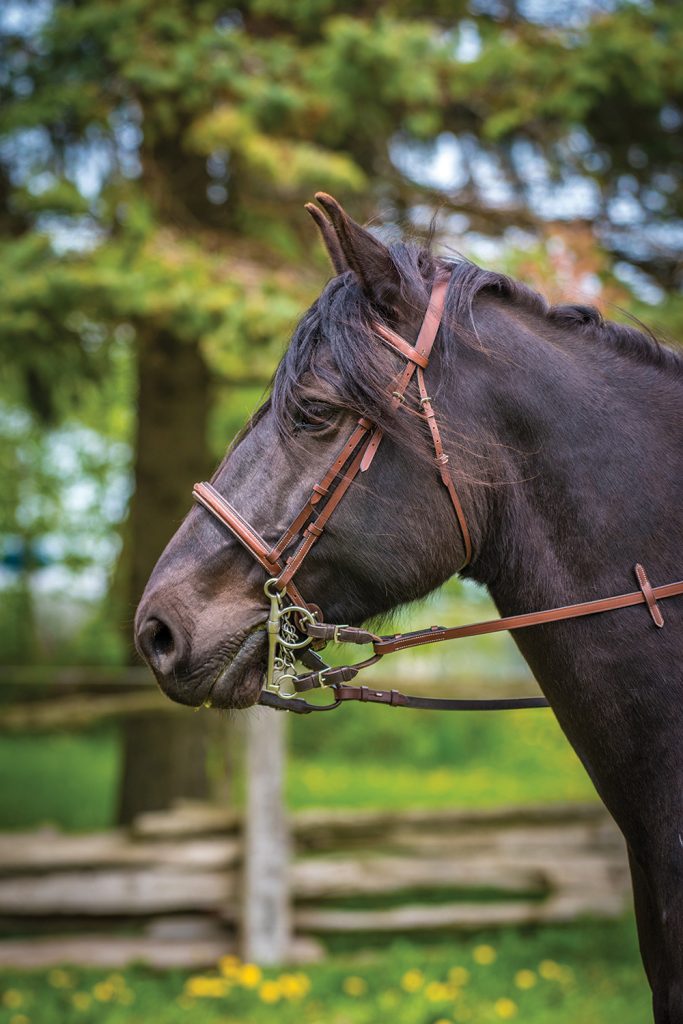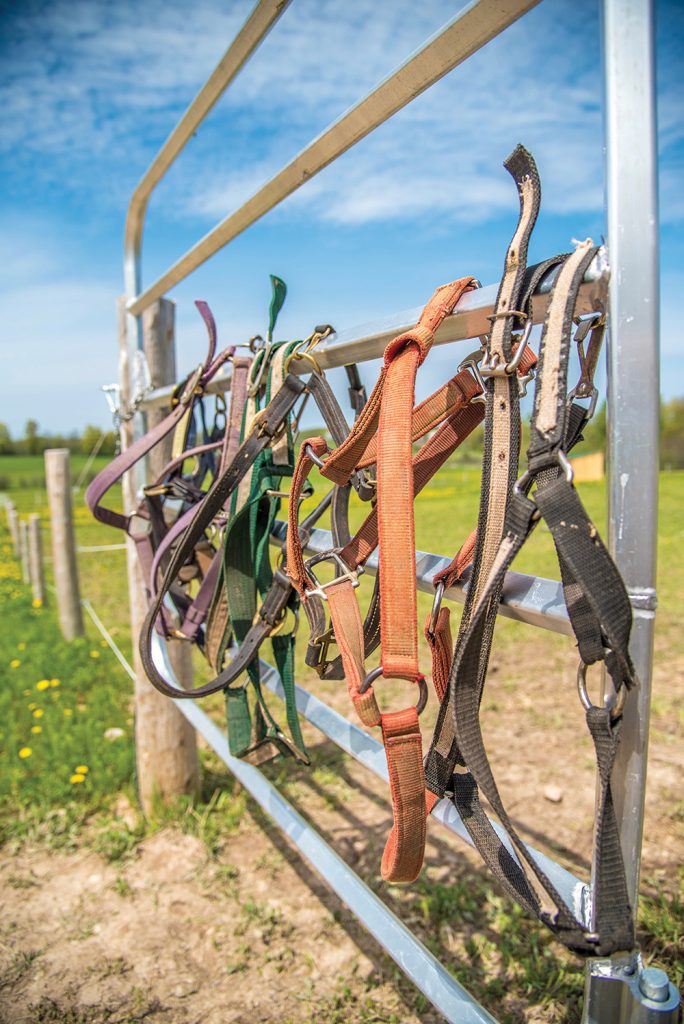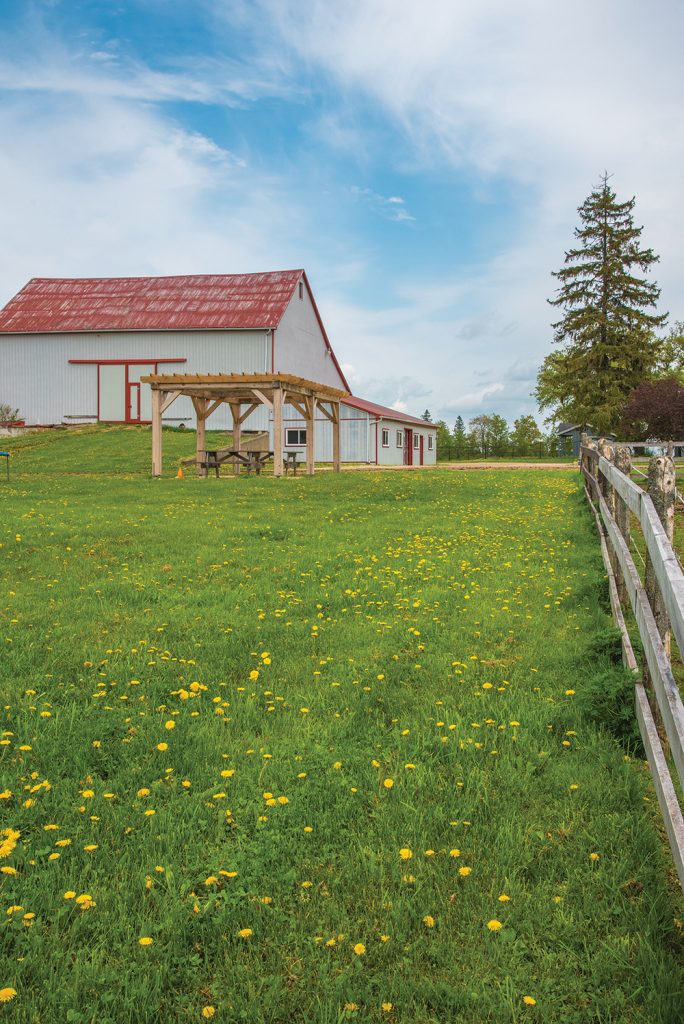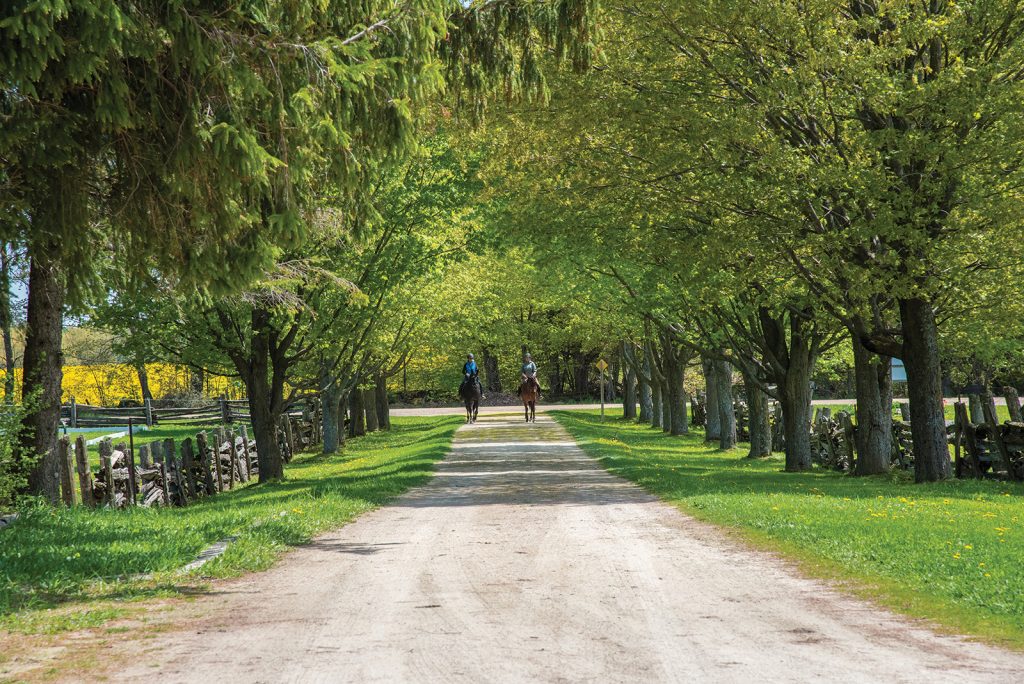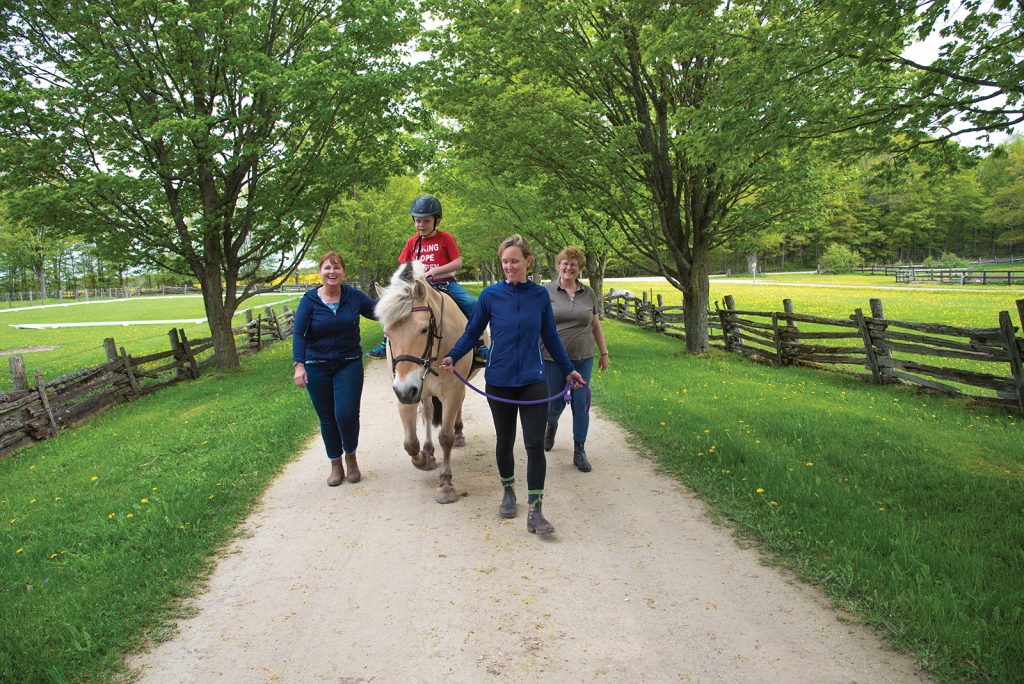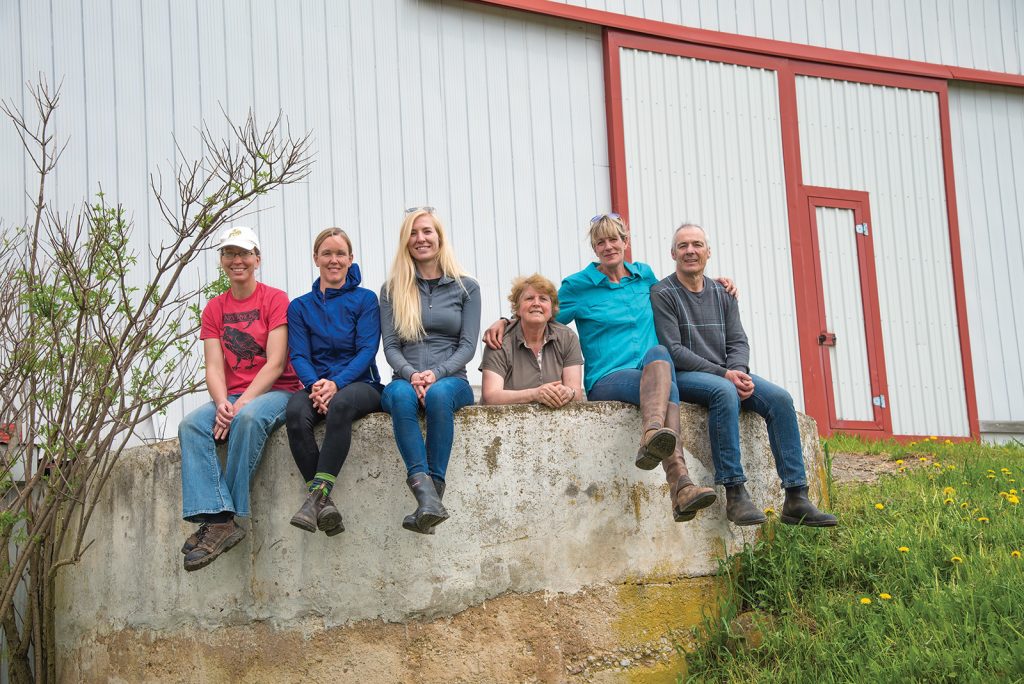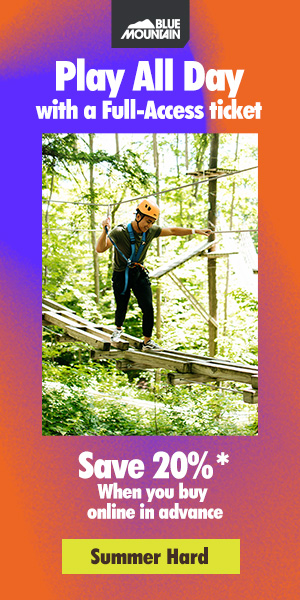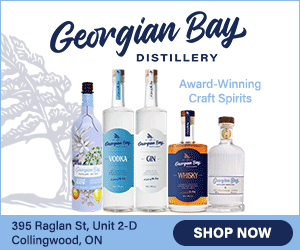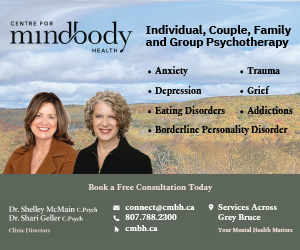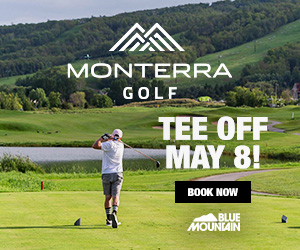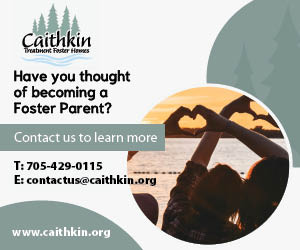How working with horses can help with healing and personal growth
by Marc Huminilowycz
photography by Doug Burlock
You have only to drive around the rural areas of Southern Georgian Bay, where horses graze contentedly in tranquil pastures and large stables and equestrian centres are abuzz with riding activity, to notice that there is an active horse culture in our region.
For some area residents, horses are a passionate labour of love, giving back to them on many levels – emotionally, recreationally and, in some cases, practically. Equestrian centres and riding clubs aside, there is far more horse power in our region than meets the eye. Some residents are working with local “equine assisted learning” practitioners to connect with horses on a deeper, more spiritual level to help them deal with emotional and health issues and enhance their personal growth.
For more than 10 years, Alexandra (Sandy) Auestad has called the Beaver Valley area home, sharing her life with her husband, horses and other animals. Wanting to know more about horses and their profound teaching capabilities led Sandy to complete the Equine Science Studies Certificate Program at the University of Guelph and other Equine Assisted Learning workshops in the U.S. Seeking a more profound connection with horses, she became a certified Advanced Facilitated Equine Experiential Learning (FEEL) practitioner in 2016. Auestad currently operates Feel Untethered, an Equine Assisted Learning (EAL) facility, at her farm in Grey Highlands.
Curious about Auestad’s discipline and techniques, I visited her farm to take part in an equine assisted learning session. I was told that there are four steps to the process, for my session or over time: experiencing, reflecting (on the experience), generalizing (taking the experience and figuring out how it could apply to myself and others), and applying (taking action to make positive changes).
Following a breathing exercise called a “heart breath” to ground myself, I walked by three horses in their paddocks to see which one would be helping me on my learning journey. One, named Dominic, immediately came right up to me with ears perked. To begin the session, with the assistance of “divining rods” (the tool also used to find underground water), I learned about being aware of my personal energy boundaries and was told that, with horses, whatever energy I put out, they would sense it and respond accordingly.
After some safety tips from Auestad, I was in the arena alone with Dominic. As I slowly approached him to sense his personal boundaries, I noticed his movements and stopped about 10 feet away. I was instructed to mentally acknowledge his presence and welcome him to come closer, which he did, calmly positioning himself right beside me. Next, Sandy asked me to connect with Dominic’s heart and listen for any messages that he may have for me.
I quickly found myself tuning out the outside world and my incessant cerebral chatter, feeling a sense of safety, friendship and trust with this large animal standing next to me. At the end of the session, I came away with several revelations about myself. The experience was profound, and has stayed with me to this day.
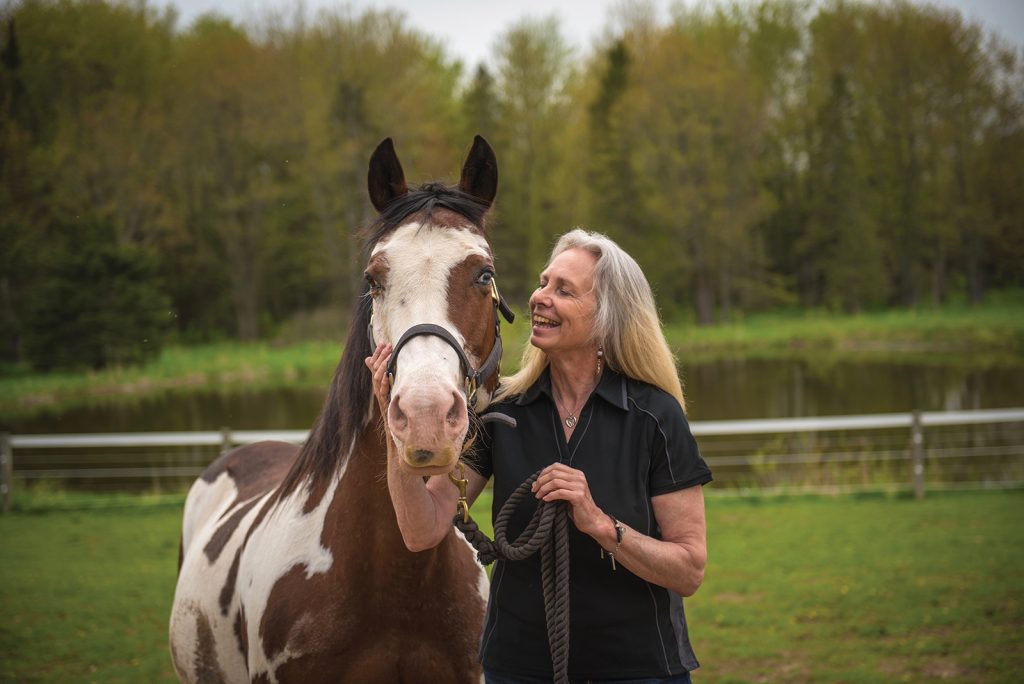
“With my stresses from day to day, horses, with Sandy’s guidance, have helped me to settle down and get into myself. They help put words to unconscious emotions, guiding me to be whole in spirit and being, healing the past and staying in the present.”
Lorelei Hay
Lorelei Hay, a teacher of Indigenous Studies at St. Mary’s High School in Owen Sound, is a client of Feel Untethered. Also involved in a martial art to help “breathe, ground myself and be in my body,” she came upon Equine Assisted Learning through a dream following a traditional Native “sweat lodge” in which she participated.
“In my dream, a horse turned into a woman,” she recalls. “A person from the Mississauga First Nation with whom I trained said to me, ‘the horse spirit wants to connect with you.’ So, I Googled ‘horse spirit’ and found a lady in Tottenham with an organization called Horse Spirit Connections that founded Facilitated Equine Experiential Learning (FEEL). After a session with them, I connected with Sandy and Feel Untethered.”
Hay claims that her EAL sessions have helped her emotionally, spiritually and physically. “ We feel so small in our complicated society,” she says. “With my stresses from day to day, horses, with Sandy’s guidance, have helped me to settle down and get into myself. They help put words to unconscious emotions, guiding me to be whole in spirit and being, healing the past and staying in the present.”
Helping people with stress and emotional issues by encouraging them to be in the moment, Denice Muzzatti, a registered psychotherapist and certified FEEL practitioner, works with Auestad and her horses as part of her practice. At her waterfront cottage property near Meaford, clients participate in retreats that include meditation, group therapy, nature walks, socializing and healthy meals in combination with an equine learning experience at Feel Untethered.
One of Muzzatti’s clients is Bianca Harris, a creative entrepreneur, makeup artist, blogger and media personality from the GTA. “I’ve worked on myself over the years, trying different ways to overcome my addictions,” she says. “None of the government resources really helped me. Then I heard that equine therapy, used as a tool for addiction recovery in the U.S., allows people to get through the process with more velocity compared to traditional person to person ‘talk’ therapy.”
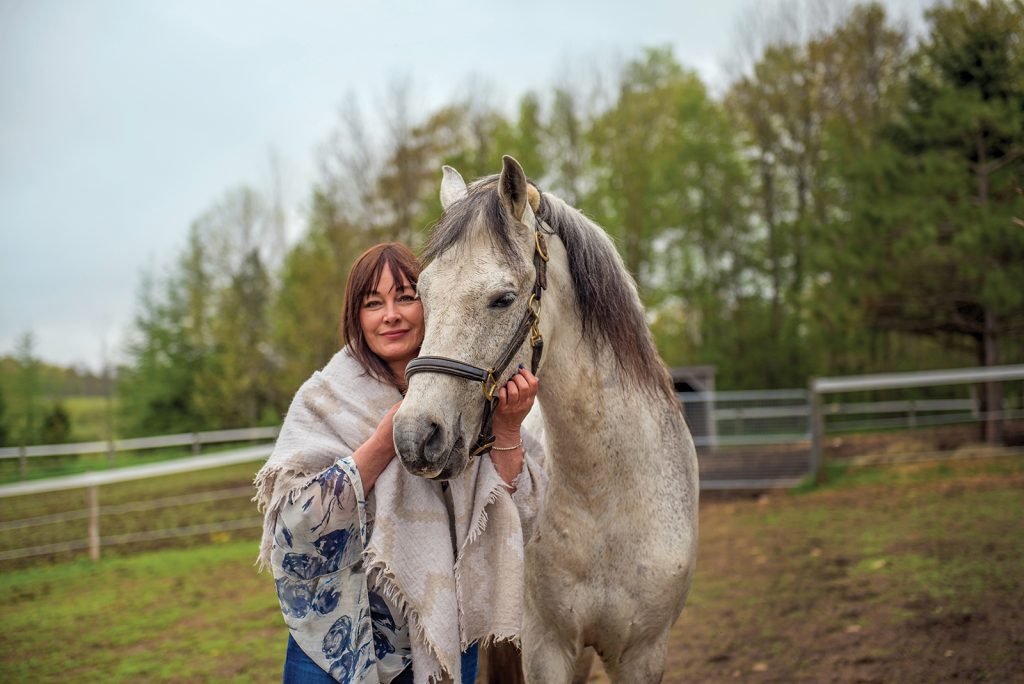
Her experience with Muzzatti and the horses was profound, says Harris. “I drove up with no idea what to expect. When I pulled in, she was standing with two horses and I immediately started crying, even though I’m not one to easily shed tears. In the arena, under the guidance of Denice and Sandy, one of the horses came at me in a bold and forthright way. He must have sensed my fear. To me, he was a representation of my father and every guy I’ve ever dated.”
Standing in front of the horse, Harris felt “weird, nervous and insecure,” at times hiding behind Muzzatti. “Sensing what was going on, the horse became more in my face,” she says. “By the end of my session, I had learned to create my boundaries so that I won’t get run over, but still maintain a bond. Denice gave me different tools to help me stand my ground while recognizing that the horse is holding a space for me. At the end, I felt confident and relaxed. The experience has allowed me to change my relationship with my father and other males in my world.”
Muzzatti says her clients are typically women ranging in age from 18 to mid-30s who are experiencing stress and anxiety, adding that she would like to work more with a mature demographic. “At my cottage, clients enjoy relaxing activities such as a hot tub, trail walks, kayaking, swimming or simply sitting by the water. Before going to Feel Untethered, the group does sound meditation to relax. After their horse session, we have dinner and process their experiences. It’s all about being together, deepening intuition and insights into who you are and connecting with yourself and what you need.”
Another local Equine Assisted Learning practitioner, Catherine Dugas, is helping people in our region to cope with past traumas through her own private practice in the Beaver Valley, called Serendipity 4. One of her clients, Laura Bennett, a kindergarten teacher from Flesherton, was going through a rough patch in her life when a trauma in her childhood surfaced, causing trust issues
“With Catherine, I learned that horses can give answers in different ways” says Bennett. “My first session started by adding colour to a mandala in order to relax. Then, using divining rods, I learned about personal energy fields and how horses can feel them. In my third session, I interacted with horses in the arena and outside, closing my eyes and asking questions through my energy about feeling scared, having nightmares and dealing with my anger issues.”
As a result of her equine sessions with Dugas, Bennett says she now has fewer nightmares, and her tension and angst have subsided. “The experience has made me more aware of all animals around us, not just horses,” she says. “I relate this to kids in kindergarten, telling them to be kind to all animals and be aware of the messages they give us.”
Dugas is a certified Advanced FEEL practitioner who also works with horses at Feel Untethered. In 2009, she left a corporate career and founded Hope Haven, a therapeutic riding and wellness centre for children with special needs (later taken over by new owners and discussed later in this story). Today, she focuses her practice on helping teenagers, people with Post Traumatic Stress Disorder (PTSD), families and cancer patients to communicate, find their emotional identity, release emotion, let go of depression and bring balance to their lives.
“I ‘get’ horses and I ‘get’ people, [but] it’s horses that make the magic,” says Dugas. “Adding sound and music therapy to the experience, the horses and I offer clients a different way of dealing with their issues, allowing them to float through their emotions. It empowers them and gives them a direction of where to go from here.”
With the help of horses, Dugas also offers leadership workshops for groups. “Participants can bring that feeling back by taking this experience with them into the real world,” she says.
Through the simple acts of feeding, grooming, riding and observing, many horse owners in Southern Georgian Bay readily admit to having a special bond with their animals. Lisa Brooker has lived in the region for 30 years, raising children with her husband, former alpine ski racer Todd Brooker, and caring for horses. By chance, she met another local Equine Assisted Learning practitioner, Carolyn Creed, and decided to find out what she was doing.
“Carolyn asked the right questions as she guided me through a session with a horse,” says Brooker. “I was reminded of the time I was raising my children and some of the tough times and traumas I’ve gone through in my life. It was a wonderful experience.
“Horses can teach you a lot. They’ve added so much in life and I keep learning from them. They give you a sense of peace if you let them in. It’s true of most animals. It’s great that we are connecting with them now. Humans are much more complicated.”
While some Equine Assisted Learning practitioners work with clients for personal growth, two local stables are using riding to help clients with more serious mental health issues, traumas and disabilities. Robyn Minifie of Triple R Ranch near Priceville began to seek healing from horses over 10 years ago following an accident that caused brain damage.
“I spent 10 years in rehab getting nowhere,” she says. “Animals were my lifesavers. Working with them, I re-mapped my brain and learned to talk again.” Minifie’s husband Daryl is also going through a healing process with horses at Triple R Ranch. An army veteran with 22 years in Afghanistan, he suffers from Post-Traumatic Stress Disorder (PTSD).
“For me, it’s not magic,” says Daryl. “Sometimes, it’s just a matter of guiding them on a lead or even just watching them eat, but feeding, grooming and interacting with horses every day allows me to go from an agitated state, feeling anger and bitterness, to a much calmer state. It gives me a sense of purpose and keeps me in balance, helping me to focus and be in the moment. The feeling stays with me long after my interactions. A lot of my friends in the military who are having issues come here as well.”
“The horses didn’t judge her as a special needs person and accepted her. Up there on the horse, Sarah was a rider like everyone else, with no crutches or disabilities.”
Alison Dakers
Alison Dakers’ daughter Sarah rides horses at Triple R Ranch to help her with the effects of her autism. Described by her mother as “a child in an adult body” with no friends when she began, Sarah has opened up and gained confidence through her weekly visits to Triple R.
“She connected with the animals and Robyn made her feel like part of the family,” says Dakers of her daughter’s experience. “The horses didn’t judge her as a special needs person and accepted her. Up there on the horse, Sarah was a rider like everyone else, with no crutches or disabilities. The whole environment at Triple R is amazing, and Robyn completely understood what she was going through.”
Minifie explains how it works: “Horses are hard-wired to be fearful of people for their own survival. If they can be de-sensitized so they learn they don’t have to be afraid, so can people with disabilities and traumas, and I help them get there,” she says. “My clients get comfortable with me first. As they help me feed and groom my horses, I assess them to determine the treatment they need.
“By approaching horses in baby steps, they learn new skills … how to manage their fears, communicate better with others, build self-confidence and take charge of their lives. I tell them, ‘On a horse, you are 10 feet tall and bulletproof!’ ”
Horses have also been helping to build confidence for Eddie, the son of Collingwood resident Jane Patrick. Eddie has a rare genetic disorder, MECP2 duplication syndrome, which causes duplicate, competing messages to be sent to the brain. His diagnosis was dramatic and devastating for his mother, who was told that Eddie was mentally disabled and would be in a wheelchair for the rest of his life.
“I said to the doctor, ‘I’m not going to accept this. Don’t tell me what he can’t do!’ ” says Patrick. “Luckily, a family I know with a kid who has leukemia told me about Hope Haven, a local therapeutic riding centre for people with special needs. Rather than focus on disability, they speak a different language to deal with it. By getting him riding a horse, they remove barriers for Eddie and provide an outlet to get him doing something he can do. The experience has given him confidence – something he can own.” Now almost seven, Eddie is able to walk well, Patrick reports. “He also skis (with assistance) and we don’t treat him any differently from our 10-year-old,” she says. “Hope Haven was a turning point for us and Eddie. It allowed us to go through darkness into light.”
According to program development manager Robyn Allen, participants of all ages and with a variety of mental and physical issues come to Hope Haven to experience the therapeutic benefits of horses, participating in mounted and unmounted activities. “We help people with physical, social, emotional and cognitive problems,” she says. “For those clients who are able, we use ‘adaptive riding’, where riding skills are taught in a modified way using special equipment and techniques.”

Riding has many therapeutic benefits, notes Allen. “Mentally, through connecting with horses, they develop a skill base that helps them with empathy, self-confidence, communication and social skills. On a physical level, riding affects every system of the body – muscular, nervous and sensory.”
Registered psychotherapist Margot Rochester works with clients at Hope Haven, in addition to having a private practice in Clarksburg, Rochester Psychological Services. With the help of Hope Haven staff, who assure safety and quality of client care, Rochester helps clients struggling with depression, anxiety, PTSD and other disorders through interaction with horses on the ground.
“It’s a team approach, with a mental health professional, equine specialist and horses acting as equal partners,” says Rochester. “Every moment, horses are taking a measure of you. As herd animals, they are social, always looking to connect and figure out their place. In an arena with a human, it’s a level playing field, and they are like storyboards upon which people can project their innermost selves without judgment. “As with other therapy, there’s an ‘aha’ moment when clients recognize patterns they’re going through and get a sense of perspective. With horses, I’m amazed at what a powerful process it can be!”
Learning and healing through horses can take many forms, and scientific research shows that Equine Assisted Learning and Equine Assisted Therapy can help with everything from motor skills, balance, coordination and physical rehabilitation to PTSD, mental illness, ADHD, conduct disorders, addictions and anxiety.
Horse interactions provide remarkable opportunities for quieting the mind, self-awareness and healing, says Sandy Auestad, adding, “Our clients enjoy an elevated spirit and are inspired to continue learning about themselves through the wisdom of the horse.” ❧







